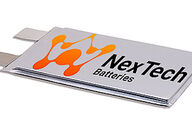Sorted by date Results 1 - 5 of 5

From coronavirus killing facemasks, to ultra-fast charging superbatteries and high-performance headphones with "stunning" sound quality, graphene has emerged as a miracle material with qualities that are likely to change life on Earth. Now, researchers believe this high strength 2D material could unlock mankind's ability to travel to other solar systems. Liquid fuel rockets can get humans to the most popular destinations across our home solar system in a reasonable amount of... Full story

Working with General Motors, researchers at the Pacific Northwest National Laboratory have discovered that a tiny bit of graphene can increase the conductivity of copper wire by 5%. "That may seem like a small amount, but it can make a big difference in motor efficiency," the Washington state lab penned in an article on the findings. "Higher conductivity also means that less copper is needed for the same efficiency, which can reduce the weight and volume of various components...

Exyn Technologies launches the newest drone in its lineup of aerial robots, the ExynAero, along with ExynPak, a new portable format that allows users to take advantage of the drone's mapping and other features where autonomy is not needed or practical. Already well known for its previous work in autonomous aerial robot systems, the award-winning Exyn Technologies has continued to pursue a truly autonomous drone that can intelligently navigate and dynamically adapt to complex G...

Diamonds are well known as the hardest minerals on earth. The sparkling gemstones also are exceptional thermal conductors and electrical insulators. Now, an international team of researchers says diamonds have yet another distinction – they can exhibit the properties of metals. The discovery, first reported Oct. 5 in the "Proceedings of the National Academy of Sciences," could write a new chapter in the saga of diamonds used in sophisticated technological and industrial a...

Italy-based Directa Plus says it has reached a tentative agreement to supply graphene for cathodes in lithium sulfur batteries being developed by NexTech Batteries. Nevada-based NexTech was founded in 2016 to advance exclusive lithium sulfur battery technology developed during 14 years of research at Lawrence Berkeley National Laboratory. The company says this emerging rechargeable battery technology has the potential to more than double the weight-to-energy-storage ratio of...